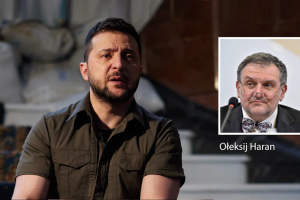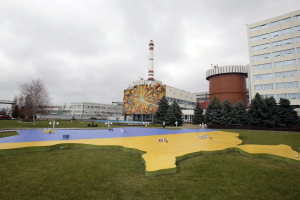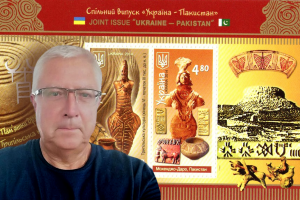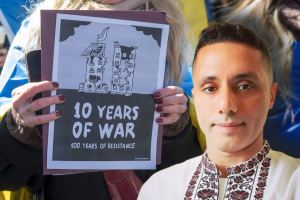
Yaroslav Reznik,
BA in Sociology,
Master’s student at the Faculty of Sociology
at the Taras Shevchenko National University of Kyiv
This intransigence concerns the unwillingness of these citizens to compromise with the enemy. Compromise is the idea of a (partial) agreement with the demands of the insidious and cruel aggressor, certain concessions to the enemy concerning pausing the war or stopping it, has no support among Ukrainians who continue to have a resolute attitude towards the liberation war of Ukraine against Russia.
Intransigent citizens do not want to agree to the aggressors’ conditions concerning the possible ceasefire. In particular, they are not willing to cede Ukrainian territory to Russia, limit the national sovereignty when it comes to the domestic or foreign policy of their country, or weaken the capability of Ukraine’s Armed Forces in exchange for the halting of fighting.
So, what factors contribute to the intransigence of the majority of Ukraine’s citizens on resistance to Russia's aggression? The present attempt to answer this question is based on the results of the survey commissioned by the Ilko Kucheriv Democratic Initiatives Foundation in July 2023. The nationwide survey “Sociopolitical moods of Ukraine’s population” was conducted by the Kyiv International Institute of Sociology in July 2023 (more specifically, the field research took place between July 3 and 17). The survey sample (N = 2011) is stratified, three-stage random with quota selection of respondents at the last step. It models the structure of the Ukrainian population aged 18+ y.o. in the territory controlled by Ukraine. Due to safety concerns, the survey did not cover the Donetsk and Luhansk regions, and the assignment for the Kherson region was performed in the neighboring Mykolaiv region. The survey was conducted using the face-to-face method and a tablet computer in Russian or Ukrainian languages. The theoretical sampling error (likelihood – 95%, design effect – 1.5) does not exceed 3.3%. [Між якістю та безпечністю, 2023].
The indicator used in this survey measures the degree of willingness among Ukrainian citizens to compromise with the Russian aggressor (see Table 1).
Table 1
The distribution of respondents’ answers: the indicator measuring the degree of willingness by Ukrainian citizens to compromise with the Russian aggressor (%)*
Please choose one of the statements that best describes your beliefs: | % among n = 1903 |
Any compromises are possible for the sake of peace | 6,5 |
Some compromises are possible for the sake of peace, but not all can be considered | 22,6 |
The war can end only if Ukraine wins | 70,8 |
Total | 100,0 |
The survey revealed that most Ukrainian citizens display intransigence when it comes to the war against the Russian aggressor. About 20% of respondents declare that partial compromises with the invaders are possible for the sake of peace. There are three times as many respondents who exclude any compromises than those who agree to partial compromises and eleven times as many as those who are ready for any compromises for the sake of peace. At the moment, the population consists of two-thirds of intransigent citizens and a third of those who are ready for compromises, mostly partial. Despite more than a year and a half of the difficult war with a stronger enemy, the civil society of Ukraine remains largely intransigent and preserves the willingness to triumph over the enemy and deoccupy its territories.
This intransigent stance has to be linked to the understanding of the high price to be paid that maintaining it requires and the understanding of its consequences in one way or the other. That is because the conscious unwillingness to compromise with the enemy means the continuation of war, threats, dangers, and likely losses. Strong motivation is required to risk, put oneself in danger, and be ready for losses due to one’s intransigence.
The psychological and social factors of personal intransigence during the war vary. Despite the fact that the intransigent stance unites most citizens, the personal motivation of Ukrainians is different. After all, the different levels of willingness to compromise also depend on various factors. That is why, it is worth considering what social indicators influence the intransigence of citizens.
Gender is considered to be a factor that strongly influences one’s life. Despite the fact that gender differences are biological in nature, they are also influenced by the differing gender identities and cultural stereotypes regarding the behavior of men and women. These differences are still present when one considers the work choices and inequalities as well as the differences in the perception of the social environment by men and women. That is why, the gender factor may influence one’s perception of the war and peace with the aggressor.
That much is emphasized by the researcher of feminism in international relations Cynthia Enloe. She used to study gender relations during wartime and advocates against ignoring the gender factor when studying international politics [Ziai, 2010: p. 45–46]. Enloe believes that women, traditionally marginalized and less important participants of social relations, unlike men who are privileged participants, have a more realistic and objective perceptive and understanding of international relations and armed conflicts. It is a matter of historical tendencies. For women, the weaker participants of social relations, the price of the mistake has always been higher compared to men who are stronger participants. This discrepancy has encouraged women to be more perceptive and moderate to avoid trouble that would most likely hurt them given their weakness.
Based on this feminist theoretical reasoning, one can make an assumption that Ukrainian women, compared to men, would be more moderate and ready for compromises with a stronger enemy for the sake of peace. At the same time, the empirical data does not confirm this assumption (see Table 2).
Table 2
Gender characteristics of respondents measured against the degree of willingness by Ukrainian citizens to compromise with the Russian aggressor (%)*
Please choose one of the statements that best describes your beliefs: | Gender | Average | |
Male | Female | ||
n = 860 | n = 1043 | n = 1903 | |
Any compromises are possible for the sake of peace | 7,6 | 5,7 | 6,5 |
Some compromises are possible for the sake of peace, but not all can be considered | 22,3 | 22,9 | 22,6 |
The war can end only if Ukraine wins | 70,1 | 71,4 | 70,8 |
Total | 100,0 | 100,0 | 100,0 |
*Correlation coefficient: χ2 = 2,802; df = 2; p < 0,246; Cramer’s V coefficient = 0,038 (p < 0,246)
Statistically speaking, there is no difference between the proportion of men and women who are intransigent towards the aggressor. Likewise, there is no significant difference between the proportion of men and women who believe that partial compromise with the invaders is possible. Overall, the results of the survey indicate that the gender factor does not have a significant impact on the intransigence of male and female Ukrainians towards the enemy. This unanimity can be explained by the fact that both men and women can be patriotic, devoted to their country, ready to protect it, and involved in civic, organizational, and volunteering activities in the interest of the Armed Forces of Ukraine to the same extent. After all, as of March 1, 2023, more than 60 thousand women were part of the Armed Force in Ukraine, including more than 43 thousand serving in combat roles [Укрінформ, 2023]. Therefore, the intransigence of the Ukrainian citizens towards Russian invaders does not correlate with traditional gender roles.
The age of people could determine their social position, including their tendency to display intransigence. At the same time, both scientific and everyday beliefs about the effect one’s age has on one’s personal social position are far from unanimous. For example, some believe that the youth is more likely to engage in active actions and civic activity. If the youth sees an external threat to the future it hopes for, it is less likely to vacillate and would rather be decisive when it comes to the defense of their country. At the same time, those of medium and old age who lived a longer life and have more life experience are more likely to accept compromises.
It is also worth taking into account the historical experience, including the experience of sharing citizenship with Russians as part of the USSR, that Ukrainian citizens of medium and older age have. At the same time, younger citizens of Ukraine had no way to experience that, which is why one should expect a higher level of intransigence towards the Russian aggressor from this group. However, the data does not confirm these assumptions (see Table 3).
Table 3
Age characteristics of respondents measured against the degree of willingness by Ukrainian citizens to compromise with the Russian aggressor (%)*
Please choose one of the statements that best describes your beliefs: | Age (4 categories) | Average | ||||
18-29 y.o. | 30-44 y.o. | 45-59 y.o. | 60+ y.o. |
| ||
n = 303 | n = 567 | n = 485 | n = 548 | n = 1903 |
| |
Any compromises are possible for the sake of peace | 6,6 | 5,1 | 5,8 | 8,6 | 6,5 |
|
Some compromises are possible for the sake of peace, but not all can be considered | 28,1 | 23,3 | 23,3 | 18,4 | 22,6 |
|
The war can end only if Ukraine wins | 65,3 | 71,6 | 70,9 | 73,0 | 70,8 |
|
Total | 100,0 | 100,0 | 100,0 | 100,0 | 100,0 |
|
*Correlation coefficient: χ2 = 15,793; df = 6; p < 0,015; Cramer’s V coefficient = 0,064 (p < 0,015)
The proportions of citizens, young and old, likely to agree to partial compromise only differ slightly. And younger citizens are more likely to compromise for the sake of peace than older citizens. At the same time, there is a certain difference between the proportion of citizens who are younger and older when it comes to the intransigent position. Intransigence is more widespread among the people of the older generation than it is among those of the younger one. Even though these differences between the two age groups are not great, one can argue that age has a marginal impact on the likelihood of Ukraine’s citizens displaying intransigence.
In modern society, people dedicate a significant part of their lives to education attainment, which is why one should analyze the impact of the educational factor on the level of intransigence towards Russian invaders among Ukrainian citizens. The education of citizens is typically associated with a deep understanding of their national identity. Further, some believe that education allows people to develop analytical thinking, an understanding of complex social reality, the ability to synthesize information from various sources, and adequate perception of various life situations and events as well as their consequences. Based on these assumptions, depending on one’s particular circumstances, the educational factor can contribute to one’s willingness to compromise or one’s intransigence towards the existential enemy of their state. After all, one’s evaluation of the situation depends on the course of the war and the sober evaluation of its results. However, the data does not confirm these assumptions (see Table 4).
Educational characteristics of respondents measured against the degree of willingness by Ukrainian citizens to compromise with the Russian aggressor (%)*
Please choose one of the statements that best describes your beliefs: | What education do you have? | Average | |||||
Primary, incomplete, full secondary education, lower vocational education | Vocational education | Complete or incomplete higher education |
| ||||
n = 488 | n = 616 | n = 797 | n = 1901 |
| |||
Any compromises are possible for the sake of peace | 7,2 | 8,1 | 4,9 | 6,5 | |||
Some compromises are possible for the sake of peace, but not all can be considered | 19,5 | 23,7 | 23,8 | 22,7 | |||
The war can end only if Ukraine wins | 73,4 | 68,2 | 71,3 | 70,8 | |||
Total | 100,0 | 100,0 | 100,0 | 100,0 | |||
*Correlation coefficient: χ2 = 10,010; df = 4; p < 0,040; Cramer’s V coefficient = 0,051 (p < 0,040)
Education does not appear to be a factor that predicts one’s intransigence. There are Education does not appear to be a factor that predicts one’s intransigence. There are some minor differences between the proportions of respondents who accept partial compromises with the invaders depending on their educational level. Only among those who believe that no compromises are possible with the enemy, there is a statistically significant difference between different groups: those with a lower educational level are slightly more likely to display intransigence than those who have vocational training.
During the war, the populations of warring countries are bound to experience worsening economic conditions because a significant part of the society’s resources is spent on military needs. The poverty of people during the war and the decreasing quality of life may impact their intransigence. In turn, this could encourage them to support the policy of compromising with the enemy. Overall, the survey data confirms this hypothesis (see Table 5).
Table 5
Economic characteristics of respondents measured against the degree of willingness by Ukrainian citizens to compromise with the Russian aggressor (%)*
Please choose one of the statements that best describes your beliefs: |
| ||||
Which of these statements best reflects the financial situation of your family? | Average | ||||
Our family barely makes ends meet and does not have money to purchase basic food goods | Our family can afford food and inexpensive consumer goods | Overall, our family has enough to live a normal life, but affording consumer durable goods is difficult | Our family is well off but cannot afford certain goods |
| |
| n = 163 | n = 727 | n = 787 | 163 | n = 1840 |
Any compromises are possible for the sake of peace | 14,1 | 7,6 | 3,7 | 9,2 | 6,6 |
Some compromises are possible for the sake of peace, but not all can be considered | 23,3 | 21,9 | 23,9 | 20,9 | 22,8 |
The war can end only if Ukraine wins | 62,6 | 70,6 | 72,4 | 69,9 | 70,6 |
Total | 100,0 | 100,0 | 100,0 | 100,0 | 100,0 |
*Correlation coefficient: χ2 = 29,479; df = 6; p < 0,001; Cramer’s V coefficient = 0,090 (p < 0,001)
Among Ukrainian citizens who are ready to accept any compromises with the enemy, most come from families that struggle to afford basic food goods. At the same time, among those displaying intransigence towards the enemy, the percentage of those who struggle the most is the lowest compared to other groups. The worsening of the financial situation of families and the decreasing quality of life during the war contribute to the willingness of the members of struggling families to protect their children and close ones from suffering and struggle at any cost. Under these conditions, these citizens may believe that the quick end of the war may improve the quality of life of their families, even if their country has to compromise with the enemy. It is only natural that the social strata of citizens who are better off financially feel more confident and are less likely to support compromises with the invaders, making them more intransigent.
During the war, the level of urbanization of the country can be yet another factor that can influence the intransigence of the population towards the enemy. Typically, it is believed that the population of urbanized territories is more likely to compromise with the enemy for the sake of peace compared to those living in non-urbanized areas. Urbanized territories are more economically developed, enjoy a higher quality of life, are more cosmopolitan in the cultural sense, and are more deeply integrated into the modern global world. These circumstances could contribute to one’s willingness to compromise during the war because it hurts one’s economic interests and worsens one’s quality of life. Meanwhile, this logic might not apply to non-urbanized areas that are less economically developed. Since the non-urbanized population does not enjoy a high quality of life, it might not value the quality of life as much as the urbanized population. That difference may contribute to the willingness of the non-urbanized population to display intransigence towards external enemies as well as make it conservative in the cultural sense. On the surface, the survey data confirms these assumptions (see Table 6).
Table 6
Settlement type of respondents measured against the degree of willingness by Ukrainian citizens to compromise with the Russian aggressor (%)*
Please choose one of the statements that best describes your beliefs: | Settlement type | Average |
| ||
Village or urban-type settlement | Population under 99 thousand | Population over 100 thousand | Average | ||
n = 722 | n = 387 | n = 794 | n = 1903 | ||
Any compromises are possible for the sake of peace | 5,7 | 4,7 | 8,2 | 6,5 | |
Some compromises are possible for the sake of peace, but not all can be considered | 21,7 | 16,3 | 26,6 | 22,6 | |
The war can end only if Ukraine wins | 72,6 | 79,1 | 65,2 | 70,8 | |
Total | 100,0 | 100,0 | 100,0 | 100,0 | |
*Correlation coefficient: χ2 = 26,361; df = 4; p < 0,001; Cramer’s V coefficient = 0,083 (p < 0,001)
The proportion of citizens accepting partial compromises with the Russian aggressor for the sake of peace is slightly higher among the residents of Ukrainian cities with a population of 100 thousand+ than among the residents of cities where fewer than 99 thousand people reside. At the same time, the proportion of citizens displaying intransigence towards the enemy is higher among the residents of smaller cities than among the residents of larger cities. These differences can be accounted for by the theory discussed earlier that explains the influence of the type of settlement or urbanization on the intransigence of citizens during the war. Still, when it comes to the Russian-Ukrainian war, it is worth noting that Russia often targets large cities with rocket attacks all over Ukraine. Many of these cities are located in the South and East of Ukraine, typically close to the frontline or right next to it. The heightened danger of living in big cities due to their susceptibility to Russian rocket attacks is a circumstance that may contribute to the willingness of its residents to support the peace process and the search for compromises with the Russian invaders.
Typically, the war increases the importance of the regional factor. That is because some regions are located closer to the frontline than others or suffer directly from the enemy’s aggression. That is why, life during the war may be experienced differently by different regions, which may influence the willingness of their residents to support compromises with the warring country or display intransigence. Overall, the regional survey data confirms this theory (see Table 7).
Table 7
Region of respondents measured against the degree of willingness by Ukrainian citizens to compromise with the Russian aggressor (%)*
Please choose one of the statements that best describes your beliefs: | Regions | Average | |||
West | Center | South | East | ||
n = 510 | n = 802 | n = 284 | 307 | n = 1903 | |
Any compromises are possible for the sake of peace | 3,9 | 4,9 | 14,8 | 7,5 | 6,5 |
Some compromises are possible for the sake of peace, but not all can be considered | 21,2 | 20,2 | 26,4 | 28,0 | 22,6 |
The war can end only if Ukraine wins | 74,9 | 74,9 | 58,8 | 64,5 | 70,8 |
Total | 100,0 | 100,0 | 100,0 | 100,0 | 100,0 |
*Correlation coefficient: χ2 = 57,838; df = 6; p < 0,001; Cramer’s V coefficient = 0,123 (p < 0,001)
Citizens living in the South and East of Ukraine are more likely to support partial and complete compromises with the invader than those who reside in the Center and the West of Ukraine. Accordingly, residents of the Center and West are more likely to display intransigence: around 75% of residents in both regions believe that war can only end if Ukraine wins. These differences between the regions of Ukraine are statistically significant. Overall, the regional factor has a certain influence on the intransigence of citizens. Due to the geographical proximity to the frontline, the residents of the South and East of Ukraine suffer most from the war, which is why they are more likely to seek peace at any cost.
The language factor might have an impact on one’s perception of international relations, especially during wartime. That is because language plays a significant role in the formation of the cultural identity of the citizens of the warring countries. Language is a cultural identifier of a nation. When one nation experiences aggression from a different one, language can likewise become the object of aggression. From this perspective, the use of Ukrainian or other languages in Ukraine should be seen as a factor that may contribute to the willingness of citizens to compromise with the Russian aggressor or display intransigence. The survey data confirms this theory quite conclusively (see Table 8).
Table 8
Language of respondents measured against the degree of willingness by Ukrainian citizens to compromise with the Russian aggressor (%)*
Please choose one of the statements that best describes your beliefs: | What language do you speak at home? | Average = 1903 | ||
Russian | Ukrainian and Russian | Ukrainian | ||
n = 397 | n = 342 | n = 1148 | n = 1887 | |
Any compromises are possible for the sake of peace | 12,6 | 9,1 | 3,7 | 6,5 |
Some compromises are possible for the sake of peace, but not all can be considered | 33,2 | 25,4 | 18,0 | 22,6 |
The war can end only if Ukraine wins | 54,2 | 65,5 | 78,3 | 70,9 |
Total | 100,0 | 100,0 | 100,0 | 100,0 |
*Correlation coefficient: χ2 = 98,063; df = 4; p < 0,001; Cramer’s V coefficient = 0,161 (p < 0,001)
Russian-speaking citizens are most willing to support any compromises with the aggressor for the sake of peace and are least likely to display intransigence. At the same time, Ukrainian-speaking citizens are least likely to seek compromises with the enemy and most likely to display intransigence. These tendencies show that the language factor has a significant influence on the intransigence of Ukrainians. Ukrainian-speaking citizens likely see the Russian aggression as an existential threat to their language, culture, and national identity. They are likely deeply familiar with the history of the enemy policy and repressions by the Russian tsarist and Soviet authorities against the Ukrainian language and culture.
Apart from the sociostructural factors, such as gender, age, education, financial well-being, settlement type, and regional and sociocultural factors, one’s willingness to compromise or intransigence can be accounted for by the sociopsychological factors. These include popular societal beliefs that dominate the feelings and thoughts of the mass consciousness. One of these factors is that of pessimism regarding the end of the war. In this context, pessimism is a perception of the course of the war characterized by the feeling of hopelessness and disbelief in its victorious and quick end for their country. It is natural to assume that pessimism about the desired short duration and success of the liberation war against the Russian aggressors negatively impacts the citizens’ intransigence. Overall, the survey data confirms this assumption (see Table 9).
Table 9
The feeling of pessimism of respondents measured against the degree of willingness by Ukrainian citizens to compromise with the Russian aggressor (%)*
*Correlation coefficient: χ2 = 44,962; df = 4; p < 0,001; Cramer’s V coefficient = 0,109 (p < 0,001)
Among the Ukrainians who are pessimistic about the war ending quickly, the proportion of those willing to compromise with the aggressor is the highest and the intransigence is lowest compared to other groups. On the other hand, the proportion of those willing to compromise with the aggressor is the lowest and the intransigence is highest among the citizens who do not share the pessimism about the duration of the war. Pessimists who do not believe that the war will end quickly support compromising with the enemy because they might believe that the long duration of the war may lead to higher losses than losses resulting from compromising with the enemy. These citizens want to avoid excessive casualties, suffering, and losses.
Another important socio-psychological factor is the subjective perception of the impact of war on one’s daily life. One’s experience of war influences one’s perception of its consequences. This concerns the stress experienced due to the war, the feelings of anxiety and fear, the loss of close relatives, financial difficulties, and losses and limitations regarding the use of one’s property. The perception of the scale of such negative consequences of the war differs significantly between the different groups of people and may influence their readiness to compromise with the enemy. Thus, one can assume that citizens of Ukraine whose life is significantly impacted by the war would want to avoid its negative consequences and, thus, be more likely to compromise with the enemy. Conversely, Ukrainian citizens who are less impacted by the war could be more likely to display intransigence. However, the survey data does not confirm these assumptions (see Table 10).
Table 10
Perception of the impact of the war on one’s life measured against the degree of willingness by Ukrainian citizens to compromise with the Russian aggressor (%)*
Please choose one of the statements that best describes your beliefs: | To what extent does that war impact your everyday life NOW? | Average | ||
It rather does not | Hard to say | It rather does | ||
n = 149 | n = 15 | n = 1739 | n = 1903 | |
Any compromises are possible for the sake of peace | 10,7 | 13,3 | 6,1 | 6,5 |
Some compromises are possible for the sake of peace, but not all can be considered | 28,2 | 6,7 | 22,3 | 22,6 |
The war can end only if Ukraine wins | 61,1 | 80,0 | 71,6 | 70,8 |
Total | 100,0 | 100,0 | 100,0 | 100,0 |
* Correlation coefficient: χ2 = 11,739; df = 4; p < 0,019; Cramer’s V coefficient = 0,056 (p < 0,019)
The highest proportion of respondents who are willing to compromise with the enemy is among the Ukrainians who do not feel the impact of the war on their everyday lives. This group also has the lowest proportion of those who display intransigence. To sum up, those who suffered from the war, are more likely to support its continuation until the victory of their country over the invaders. Meanwhile, those lucky to not experience the war’s impact try to avoid it and are ready for partial or any compromises with the aggressor. In other words, the threats and risks caused by the war are more likely to cause people to compromise with the enemy than the negative consequences experienced when countering the enemy.
***
If one considers all factors that impact the intransigence of Ukrainian citizens, the language and regional factors are the most significant ones, which is evidenced by the X2 and Cramer’s V coefficients. To a lesser extent, one’s perception of the duration of the war is another important factor. To a lesser extent, one’s perception of the impact of the war on the everyday life of citizens, including their financial well-being, affects one’s intransigence.
Overall, one can argue that the intransigence of Ukraine’s citizens towards the Russian aggression is largely motivated by sociocultural and sociopsychological factors. This phenomenon requires further investigation.
Sources
Між якістю та безпечністю: шкільна освіта та вступні випробування в умовах війни – Фонд «Демократичні ініціативи» ім. Ілька Кучеріва. 11 серпня 2023 року. URL: https://dif.org.ua/article/mizh-yakistyu-ta-bezpechnistyu-shkilna-osvita-ta-vstupni-viprobuvannya-v-umovakh-viyni?fbclid=IwAR2z18IherQs25Cw7tERvJI53YcyIdSk_sySYejOAcNunUfsWw64pcwPyDk.
Укрінформ (2023). Кількість жінок-військових у ЗСУ з 2014 року зросла у 2,5 раза. (15.03.2023). URL: https://www.ukrinform.ua/rubric-ato/3682549-kilkist-zinokvijskovih-u-zsu-z-2014-roku-zrosla-u-25-raza.html.
Ziai, A. (2010). Post-positivist metatheory and research in International Relations: A comparison of neo-gramscian, feminist and post-structuralist approaches. Hamburg review of social sciences, 5 (1), 32–61.








